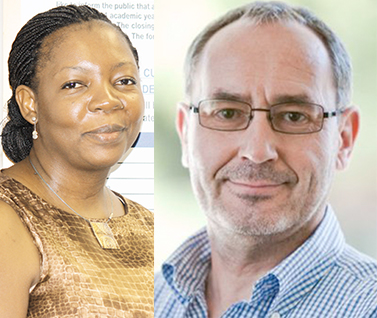By Shinovene Immanuel and Ndapewoshali Shapwanale | 22 Decemebr 2016
THREE relatives of the state scholarship fund’s chief executive, Hilya Nghiwete, benefited from a special bursary schemes that avoided normal application procedures and requirements.
Nghiwete is also accused of potential conflict of interest, because her stepson is employed and is being mentored by the Namibia Students Financial Assistance Fund’s (NSFAF) consultant.
The three relatives, who were sent to study in Malaysia, are her brother Fillemon Kauluma, her stepson Natangwe Nghiwete, and sister Toini Kauluma. The NSFAF provides financial loans and scholarships to needy full-time Namibian students at recognised institutions of higher learning.
Nghiwete’s brother Fillemon Kauluma, a former teacher, studied design and visual communication at the Limkokwing University of Creative Technology from 2013 to 2015.
Fillemon then benefited from another special initiative bursary scheme to study in Finland in 2016 for one more year, after realising that the degree he had obtained in Malaysia was not recognised by the Namibia Qualifications Authority.
The CEO’s stepson Natangwe Nghiwete studied advertising at the same university in Malaysia as Fillemon Kauluma, while Toini Kauluma studied design and visual arts at the Multimedia University.
The three studied communication-related courses, yet NSFAF said this project was an effort to search for opportunities for Namibians to access tertiary education in programmes that are either not in Namibia or are offered in limited capacity.
Nghiwete denied any wrongdoing, claiming that she declared her family interest to the board of directors who approved the scheme.
It is not wrong for Nghiwete’s family to benefit from the fund as long as they meet the requirements, but one senior government official said the fact that the three were awarded scholarships through special initiative schemes, raises eyebrows.
The source said special initiatives are often created “to avoid procedures and requirements for getting funding” or when the opportunities do not fall directly within the normal NSFAF funding process.
“Ask where the guidelines for special initiatives are and who makes the recommendation to the selection committee. What is the extent of her involvement in the whole process?” a source who declined to be named said.
Nghiwete insisted that the three did not benefit from special initiatives, but her relatives were studying as part of a project in Malaysia initiated by former education minister David Namwandi.
“I have yet to see a board or any management declaring interest in the list of awardees,” she said when answering The Namibian’s questions about conflict of interest.
She said the 17 teachers who graduated from Malaysia were advised to study for their masters degrees in education in Finland. The graduates were also given the option to go back to Malaysia for a master’s degree despite their previous qualification being downgraded.
Nghiwete said she does not understand why The Namibian is only interested in three individuals when NSFAF sponsors more than 12 000 Namibians yearly.
“You are now becoming personal and clearly you have an agenda,” she said after The Namibian asked further questions.
NSFAF’s corporate affairs officer, Olavi Hamwele, said he does not see anything wrong with Nghiwete’s three relatives benefiting from NSFAF.
The three relatives are part of 180 scholarship beneficiaries selected to study at different universities, he said. The student fund normally supports students based on, among others, the requirement that parents’ joint income is not more than N$750 000 per year.
Hamwele however said the Malaysian scholarships were exempted from this requirement because they were not the usual NSFAF study opportunities.
“The CEO had played no role in the selection process. The selection was conducted by an independent committee in conjunction with the relevant universities where the prospective students intended to study,” Hamwele said, adding that the three individuals are adults and eligible to benefit like any others.
“They applied on their own accord. NSFAF policy does not discriminate against potential beneficiaries based on family ties,” he said.
According to NSFAF, the scholarships for Finland were advertised in seven newspapers on 18 August this year, in order to invite additional qualifying Namibian students to meet the 25 students required for the study opportunity.
Nghiwete did not say whether the scholarships for Malaysia were advertised in 2013 when her relatives benefited. She further said the question on how much it cost NSFAF to fund her three relatives is irrelevant, because costs are determined by the educational institutions and not NSFAF.
CONFLICT OF INTEREST
The relationship between a technology consultant working for the fund has also come under scrutiny. The government’s Southern Times weekly reported three weeks ago that NSFAF awarded a technology tender to a company called Kudu Net Close Corporation, which is owned by a Thomas Mueller, who also works as NSFAF chief information officer.
He was reportedly paid around N$100 000 for his work for the fund in January this year. Muller employs Nghiwete’s son, Natangwe, through Rainmaker, a hospitality marketing company. Natangwe’s LinkedIn, which has since been edited, showed that he works as head of search engine marketing for Rainmaker. He has worked there since July 2016.
“I currently have the privilege of having Thomas (Mueller) not only as my mentor on my new business venture, but as my coach too,” reads his biography on the LinkedIn account.
Mueller is not only connected to Nghiwete through her son, but they have known each other since 2010. In fact, Mueller also worked for Nghiwete’s private business at her lodge called Ongula Lodge between Ondangwa and Eenhana. Additional questions sent to NSFAF, Nghiwete and Mueller were not answered. Mueller is on annual leave until 7 January.
*This story was produced by The Namibian’s investigative unit. Send us story tips via your secure email to: investigations@namibian.com.na.






